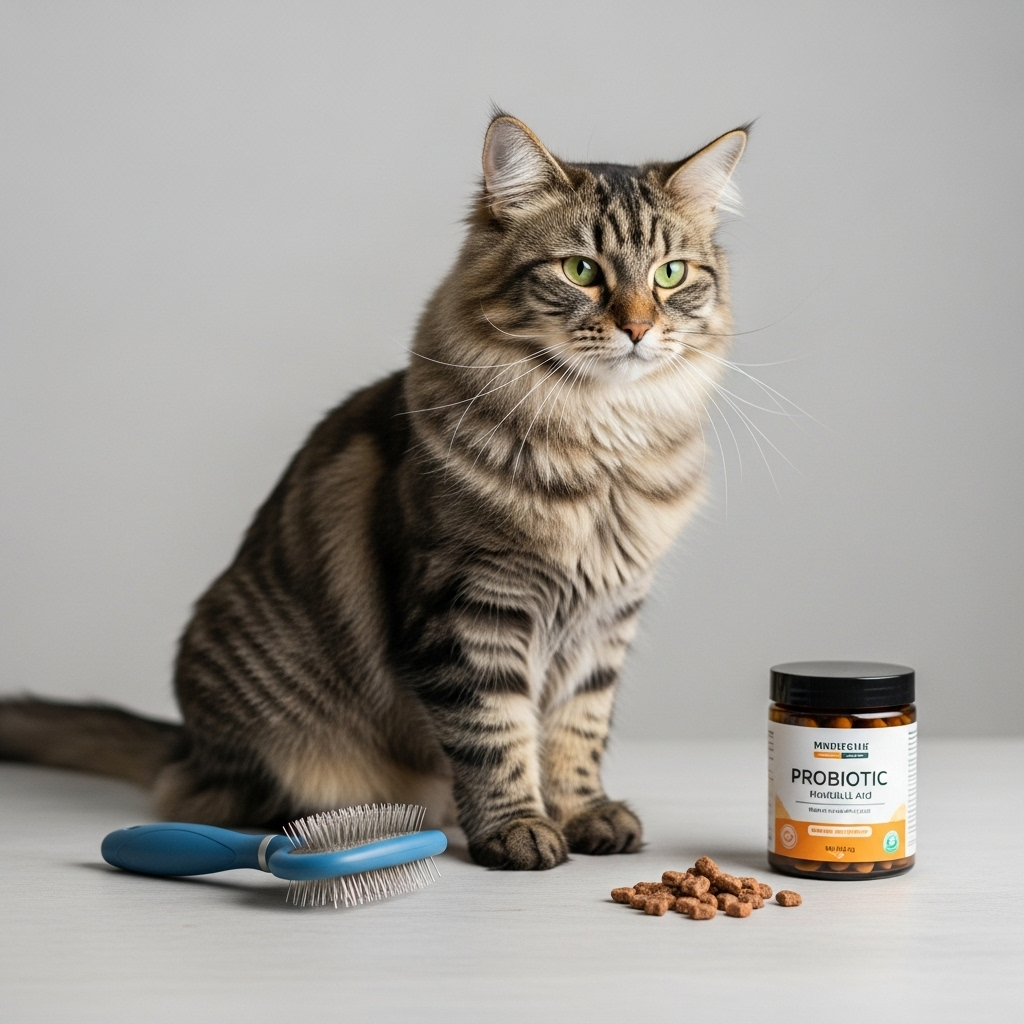Can Probiotics Help With Hairball-Prone Cats?

Hairballs are a common nuisance for many cat owners. While regular grooming and diet changes are primary strategies, probiotics are increasingly discussed as a supplemental option. This article explains what probiotics are, how they might affect hairball formation, what the evidence says, safe use tips, and when to seek veterinary care.
What are probiotics?
Probiotics are live microorganisms—usually specific strains of bacteria or yeast—that, when administered in adequate amounts, can provide health benefits to the host. In cats, probiotic supplements are designed to support healthy gut flora, improve digestion, and sometimes modulate immune responses. Common probiotic strains marketed for cats include strains from Lactobacillus, Enterococcus (e.g., Enterococcus faecium), Bifidobacterium, Bacillus, and the yeast Saccharomyces boulardii.
How could probiotics help with hairballs?
Probiotics are not a direct hairball remover, but they may help reduce hairball problems through a few plausible mechanisms:
- Improve gastrointestinal motility: Balanced gut flora might help move ingested hair through the digestive tract more efficiently, reducing the amount that accumulates and needs to be expelled as a retch.
- Improve stool quality: Healthier digestion can lead to firmer, more regular stools that help carry some hair through the intestines instead of allowing it to form clumps in the stomach.
- Reduce inflammation or dysbiosis: If a cat’s gut is inflamed or out of balance, digestion and motility can be impaired. Correcting that imbalance may indirectly lower hairball formation.
- Support overall gut health during dietary changes: When switching to high-fiber or special diets to manage hairballs, probiotics can help some cats adapt without gastrointestinal upset.
What the evidence says
Research specifically linking probiotics to reduced hairballs in cats is limited. Most veterinary guidance about hairball prevention emphasizes grooming, fiber, hydration, and hairball lubricants. Evidence for probiotics is mainly anecdotal or extrapolated from studies showing probiotics can improve general gastrointestinal health in cats. In short, probiotics may help some cats as part of a multifaceted approach, but they are not a guaranteed standalone solution.
Choosing a probiotic for a hairball-prone cat
When selecting a probiotic, consider the following:
- Species-specific or pet-labeled products: Choose products formulated for cats whenever possible—doses and strains differ from human supplements.
- Strain transparency and CFU counts: Look for products listing the strains used and a guaranteed colony-forming unit (CFU) count through the end of shelf life.
- Quality and storage: Some probiotics require refrigeration while others are shelf-stable. Follow the label for storage to maintain viability.
- Veterinary recommendation: Ask your veterinarian for products they trust. They can recommend strains and formulations appropriate for your cat’s health status.
Dosing, administration & safety
Follow the product label and your veterinarian’s advice. General points:
- Start with the manufacturer’s recommended dose for your cat’s weight and age.
- Introduce probiotics gradually and observe for changes in appetite, stools, or behavior.
- Mild side effects can include temporary gas, softer stools, or mild vomiting during the first few days.
- Avoid giving human probiotics to cats unless directed by a vet—strains and doses may not be appropriate.
- Probiotics are generally safe for healthy cats, but use caution in immunocompromised, critically ill, or severely debilitated animals because live microbes may pose rare risks in those populations.
Other effective strategies to reduce hairballs
Probiotics should be considered complementary to established hairball prevention methods:
- Regular grooming: Brushing reduces loose hair ingestion. Long-haired cats benefit from daily grooming.
- Dietary fiber: Increasing soluble or insoluble fiber can help move hair through the digestive tract. Many hairball formulas contain added fiber.
- Hydration: Wet food or increased water intake supports intestinal motility.
- Hairball lubricants: Petroleum-based or other veterinarian-recommended pastes can help hair pass through the gut more easily.
- Environmental management: Reduce shedding triggers (stress, poor nutrition) and maintain good coat health with balanced diets rich in omega fatty acids.
When to see your veterinarian
Consult your veterinarian if your cat:
- Has frequent or worsening hairball episodes despite grooming and diet changes,
- Shows signs of persistent vomiting, weight loss, lethargy, or decreased appetite,
- Has blood in vomit or stools, or seems in pain when trying to vomit, or
- Is a kitten, elderly, or has known immune problems before starting any supplement.
These signs may indicate a gastrointestinal obstruction or a medical condition requiring prompt evaluation.
| Pros | Cons |
|---|---|
| May improve gut motility and stool quality | Evidence for direct hairball reduction is limited |
| Can support gut health during diet changes | Some cats may have temporary GI upset |
| Generally safe for healthy cats | Not appropriate for severely immunocompromised or critically ill cats without vet approval |
FAQ
- Q: How long until I see results?
- A: Some cats show improved stool consistency or fewer hairball episodes within 2–6 weeks, but responses vary. If there’s no improvement after several weeks, discuss other options with your vet.
- Q: Can I give my cat human probiotics?
- A: It’s best to use cat-specific products. Human probiotics may contain inappropriate strains or doses. Only use human products if directed by a veterinarian.
- Q: Are probiotics safe for kittens?
- A: Many probiotics are formulated for kittens, but confirm age-appropriate dosing and consult your vet before starting supplements in very young animals.
- Q: Will probiotics replace grooming and hairball pastes?
- A: No. Probiotics are complementary. Regular grooming, dietary fiber management, and lubricants remain primary tools for hairball control.
Key Takeaways
- Probiotics may help reduce hairballs indirectly by improving gut health and motility, but evidence is limited.
- Use cat-specific probiotic products, follow dosing guidance, and store them as directed.
- Combine probiotics with grooming, dietary changes, hydration, and hairball lubricants for best results.
- Consult your veterinarian before starting probiotics—especially for kittens, senior cats, or immunocompromised animals.
- Seek prompt veterinary care for persistent vomiting, weight loss, or signs of obstruction.
Note: This article provides general information and is not a substitute for veterinary advice. If you have concerns about your cat’s health, contact your veterinarian.

Leave a Reply